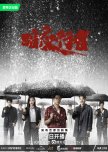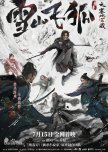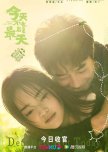
My dear, I don't give a damn.
Gone with the Rain is one of the few Chinese dramas out there that has a very apt English title. It is also set in a time of civil war and the design of the four main characters are unmistakably inspired by Margaret Mitchell's epic classic novel Gone with the Wind. It is very much a character drama that is at surface a romance, but the true love story is the one between two women who are almost diametric opposites of one another.This story takes place in a fictional Jing state but the costumes and background suggests this loosely is late Tang dynasty when the powerful local military governors rebelled. Vast swarths of the country was thrown into civil war during which the central government had little knowledge or control over what was happening. The drama's greatest failing is that it is very sloppy in terms of clearly explain who the different factions and what their agendas are. Events unfold conveniently and not always logically simply to enable character conflict and development.
The story is told largely from seventeen year old Tang Moxi's perspective. She breaks the fourth wall in the beginning and continues to share her thoughts via very vivid, at times funny and at times silly daydreams. Moxi is illegtimate and orphaned at an early age, she grows up on sufference in the household of her uncle Bai Wentao a scheming mid-level official. Her first cousin Bai Fengyao its the only one that cares for her. The drama opens with the country on the verge of civil unrest. The cousins are colluding to evade their family's efforts to marry them off for advancement. Moxi rescues a dashing wounded soldier Wan Jiagui and falls for him. She also encounters an infuriating general Chen Wende. Through a series of misunderstandings, some self inflicted Moxi finds herself caught between both men while Wan Jiagui finds himself engaged to both women. A tortuous romantic quadrangle between the four plays out as the country slides into chaos. The romances are secondary to how the relationship between the women navigates civil war and a messy love rivalry.
Despite their different personalities and perspectives, Moxi and Fengyao share a touching and unbreakable bond. Moxi is fiesty, selfish, cynical, manipulative and tough as nails beneath her lovely exterior. She is above all a survivor; she has to be as there is only the rather helpless Fengyao in her corner. Fengyao is pretty much everything Moxi is not - selfless, well educated, gentle, sentimental, idealistic,and impractical; in other words quite useless. Their strengths and weaknesess complement and together, they are able to acutally fend quite well for each other. Unfortunately they both fall for the gallant, noble hero in heroes clothing Wan Jiagui who when tested is actually a weak character. Moxi spends most of the drama fighting her devastating attraction to Chen Wende, a rough, uncouth warrior who is more than what he appears to be. He is the only character that remains charismatic and likable throughout the drama. After awhile, it is quite obvious where these four main character blueprints are from.
The first half of the drama is quite enjoyable as Moxi and Fengyao find their strengths and struggle with their flaws in trying times. However, Moxi's wilful blindness and her obstinate pinning for her first love went on for so long it became tedious. I wanted to hurl my remote at her and yell "My dear, I don't give a damn!" Even though all the portrayals are well done and the characters are multi-dimensional, this drama spends too much time rehashing character flaws without a well fleshed out plot to keep things engaging. The conflict and attraction between Chen Wende and Moxi is the only highlight of the second half of the drama which made it less of a struggle. I also enjoyed the casting of an actress in the role of Wu Yin. The second relationship however is not sufficiently developed because all of the men can only have eyes for Moxi. The final arc is rushed and Moxi's ability to transform herself is not well explained and frankly impossible. The story does come to a satisfying ending with the final episodes making up for the sag in the latter half. This is different enough from the usual run-of-the-mill historical Chinese drama that I enjoyed many aspects of it. It is quite well acted and had it been shorter and more tightly written, I'd probably rate it better than 7/10.
Was this review helpful to you?

She's just not into you anymore.
The Luo family is in gentle decline as the second generation is unable to match their late patriarch's illustrious career in civil service. They look towards the complacent and entitled third generation to revive the family's fortunes with a growing sense of anxiety. It is to this backdrop that Luo Yining returns from the family's country villa to celebrate her ailing grandmother's birthday after falling out with Luo Chengzhang and concubine Qiao as a child. Chengzhang is a frustrated and resentful civil servant of middling talent with a very small heart that only has room for Qiao's children. Yining is appalled to find her "third brother" Shenyuan shunned and bullied by the family and as unfavored children and they become fast allies. They are both not who they appear to be and gradually they uncover and keep each other's secrets as together, they navigate treachery both within and outside the Luo household.This kind of saga that depicts the rise and decline of a family has been a popular genre since the 18th century classic vernacular novel 红楼梦 Hónglóumèng/Dream of the Red Chamber resonated deeply with its philosophical questions and social critique of feudal patriarchal society. While the narrative unfolds around the main protagonists it is not just about them; it explores broader social themes through related character stories and sub-plots told from their point of view. Every character has their own cross to bear. Chengzhang for example, is at surface a bad dad but he was also someone whose ambitions never materialised and who twice had to marry a woman not of his own choosing. Yining's return ruined the three people who meant the most to him. Maybe he gets off lightly or maybe fate was already unkind enough to him.
This drama gives the strong impression that it is a lighter, more accessible version of The Story of Minglan (SOML). The production quite cheekily acknowledges this by installing Yining in Haitang Pavilion and naming her mother Gu Minglan. Many of the main character blueprints of the Luo family down to the costumes and styling and the plot arcs around the inner harem rivalries and the mystery of Yining's mother's death smack of SOML. As someone who didn't enjoy SOML, I don't have a problem with it. Even though SOML is undeniably a more sophisticated and culturally impactful production, I found the pacing and the narrative approach suffocating. Even though it is less well written and not that original, The Rise of Ning is a more enjoyable watch overall. The biggest difference for me is Shenyuan is more interesting, better written, better portrayed and more empathetic than the male lead in SOML. Zhang Wanyi never disappoints in delivering yet another immersive and complex portrayal of this seemingly mild mannered and humble unfavored son with hidden depths. His strength is in being too casually overlooked and underestimated by his enemies. The story's biggest drawback is the romance is held back for so long that Zhang Wanyi and Ren Min's chemistry as a couple is under-explored.
Even though the narrative does incorporate a few interesting and new ideas, they are not fleshed out properly and are bogged down by lazy writing, shallow character designs and logic that does not hold up to close scrutiny. The main romance is weighed down by the fact that Yining and Shenyuan remain "siblings" for almost three quarters of the drama. I understand this was so she could remain in the Luo mansion but I think that the truth should have been revealed to both Shenyuan and Yining at the same time. They could keep it from everyone else while they try to solve the mystery of her mother's death and figure out who she really is. This would allow their romance to progress earlier on in the storyline and not leave the audience with such an entrenched impression of their chemistry as siblings. Another better approach could have been to skip the boring, tropey harem squabble arcs and move up the reveal because the characters in the Wei manor are more original and engaging. This would have also allowed a fuller development of Yining's relationship with Wei Ying, who is such a fantastic and memorable character who is both funny and moving at the same time. None of the women in this drama, nasty or nice, are prone to shrill, ear-piercing screeching, which was what I found most off-putting about SOML. In fact the smart, sassy and sarcastic Lin Hairu is one of my favorite characters and a huge upgrade from SOML.
Even though I enjoyed Ren Min's charming portrayal of Yining, her acting is still a work in progress. Her lines are too tentative and lack the depth of expression needed to capture the maturity, sensibility and intelligence of the character. Her voice is so distinctive that I also didn't for one moment buy it that Lu Jiaxue did not instantly recognise her as Meimei. I think she could have credibly dubbed herself as Meimei but when she grows up to become Yining, a more nuanced professional voice actor should have taken over. Her character is also not that consistently written. She indulged in a reckless and inappropriate dalliance with a much older man but showed enough good sense not to tell him who she really was. It is a relationship that mortifies and haunts her and when she encounters him again, she clearly fears and loathes him. What is not well conveyed is how he may have still occupied a space in her heart. This didn't come out until the end; which made me wonder why she never gave Lu Jiaxue a chance to clear up the misunderstanding or severe past ties with him neatly. The way she handled the situation was very immature and not like the Yining who faces her problems calmly and frankly. As a result, she never gave him or herself closure and in this, she was also not fair to Shenyuan.
As a villain, Ci Sha's portrayal of Lu Jiaxue deserves top marks. He was almost too powerful, seemed to answer to no one and was able to walk prisoners in and out of jail and cut down his enemies in plain sight. He was so intensely menacing and brutal that every time he showed up, my throat went dry and I felt a knot of fear in the pit of my stomach. But the character is too one dimensional and not well written. It is difficult to reconcile such a heavy handed portrayal of an irredeemably cruel and callous bad guy with someone even a pubescent Yining could have fallen for. It is equally disturbing and difficult to understand a grown man's obsession such a very young and very naive girl. The "she's not into you anymore" trope is one that should win audience sympathy because it is much easier to get over unrequited love than it is once-requited love. However, the portrayal of Lu Jiaxue as a love rival missed the mark and completely alienated me. It was nothing short of offensive to watch him paw Yining and manhandle her time after time. That is not the way to woo a girl, nor is openly trying to kill her favorite brother! These are not the actions of a character that is allegedly cunning, manipulative and smart. I would have liked to see a more multi-faceted, subtle and refined love rival, one that actually is a credible challenger instead of one that is so obviously beyond redemption. This tiresome obsession went on for too long and overshadowed the development of Yining's feelings for Shenyuan.
Even though the plot builds to a satisfying ending climax, I rolled my eyes at how how the final episodes descended into a Phantom of the Opera like theatrics. I didn't think Lu Jiaxue got his just deserts and found everyone's willingness to forgive baffling and out of character. But overall the storytelling and pacing was consistent and engaging throughout and the supporting cast really pulled their weight. I enjoyed the second couple and many characters beyond the leads. Overall a very solid and entertaining watch that I rate 8.0/10.0.
Was this review helpful to you?

The abyss looks into you.
Escape from the Trilateral Slopes 边水往事 is a thrilling survival adventure drama adapted from Shen Xingxing's autobiographical account of his year in The Golden Triangle. The Golden Triangle is a large mountainous terrain at the confluence of the Mekong and Ruak rivers and is comprised of northeastern Myanmar, northwestern Thailand and northern Laos, bordering Yunnan. Despite multiple coordinated crackdown efforts, The Golden Triangle has long been the world's largest drug producing area; initially of opium and subsequently synthetic drugs, especially methamphetamines. It is also a hot bed of related illegal activities from timbering to gambling and is a lawless place where local warlords control different territories and businesses. Names of places and people have been changed to protect the guilty so for the purposes of this drama, the Golden Triangle is Sanbianpo and the story opens in Monung, in the fictional Republic of Bomo. Meticulous research and attention to detail is evident in the world building, to the point of inventing local dialects and written languages. As impressive as this effort is, I would have preferred they staged it in the real respective Southeast Asian countries. However, unlike Hollywood, Chinese productions shy away excessively from portraying other countries and nationalities in an unflattering way. @Frost_edelweiss has meticulously documented this production and the setting in the discussion section for those interested in more details.Shen Xing decides to skip college to join his uncle's construction company and shows up unannounced in Monung, to his uncle's dismay. He quickly discovers that Sanbianpo is no tropical paradise but a complicated, sunny place for shady people. To collect on bad debts, his uncle ventures into a conflict zone and disappears, leaving Shen Xing to hold the fort. Facing a liquidity crunch, Shen Xing borrows money from loan sharks at usurious rates to make payroll. Things snowball as desperate to find his uncle, he gets involved with counterfeiters and finds himself framed for murder. Before he knows it, he is a fugitive fleeing many different forces. He ends up indebted to Uncle Cai, a wheeler-dealer businessman who juggles the various competing forces in Sanbianpo. Thus Shen Xing becomes the patsy that Uncle Cai nonchalantly sends off on increasingly perilous missions. Before long, he is finds himself embroiled in all aspects of the Sanbianpo economy; sending provisions to drug dealers, smuggling gems, cattle farming; timbering, gambling; everything short of drug trafficking. That is Uncle Cai and his men's bottom line; the one they vowed not to cross. The story highlights how divisive the drug trade is; with some forced into it by poverty or conscription while others doggedly avoid it after losing loved ones to its trade or use.
I am pleased to see Guo Qilin step out of his comfort zone to take on this role of Shen Xing. And he delivers an acceptable portrayal overall but one that is lacking on several notable fronts. For starters, he doesn't look the part so it is a stretch to imagine he is hardy or athletic enough to survive numerous life endangering encounters. To make matters worse, it is absurd to pair him up romantically with a lanky actress like Qi Xi; even though she pulls off her role well, I cringed through that entire arc. He does a credible job humorously portraying the bewildered, naive young man who looks into the abyss and only manages to survive by sheer luck. His critical fail is in conveying what happens when the abyss looks into you. His character stays largely the same throughout and in moments of trauma, dumbfounded tends to be his default expression. This stands at sharp contrast with young actor Zhao Runnan's compelling portrayal of Guo Limin's shattering darkening and psychological downfall. What saves the day is there is fantastic rapport between the entire cast and Shen Xing's relationships with Uncle Cai, Dan Tuo, Wang Anquan, Lan Bo and even the hapless Justin seem authentic and moving enough to make me root for all of them. His enemies into besties relationship with Dan Tuo and how Dan Tuo silently looks out for him is one of the highlights of the story. Jiang Qilin is a fantastic actor and his Dan Tuo stole the show for me and is the unsung hero of the story. I also thoroughly enjoyed Jiang Qiming's hilarious portrayal of jack-of-all trades in the middle of all scams Wang Anquan as well. The villains are satisfyingly nasty and heinous; from the duplicitous Ang Tan to the viciously scary and hateful Mao Pan. While I wish they had cast a stronger character actor like a Liu Haoran as Shen Xing, the entire cast is so exceptional that their riveting portrayals paper over most of Guo Qilin's shortcomings.
The enigmatic, utterly ruthless and diabolically charismatic Uncle Cai is the lynchpin of this story. He is the most fascinating, multi-faceted character in the story. At surface, he is pragmatic, reasonable, an incredibly devout Buddhist and loyal to his wife's memory; a ruthless businessman when he needs to be but one with a bottom line. Thus he is not a villain for the sake of villainy but only when it serves his purpose; there is a utilitarian calculus involved in every action and decision. He doesn't hide who he is or what he is about but this is masked by his devoutness and humble persona and how he disarmingly switches between Cantonese, Mandarin and local dialects to best convey his sincerity. Only a highly skilled veteran actor like Francis Ng can deliver such a mesmerising portrayal. Like Shen Xing, Dan Tuo and his many followers, I was so dazzled, almost spellbound by his personal charisma that I didn't look too hard at his actions. He callously sends Shen Xing out on missions without full information but seems so wholeheartedly delighted that he survives time and again that I forget that he is the guy that tossed him in the frying pan and turned on the fire at the same time. Uncle Cai holds his cards close to the chest and never explains himself unless he has to. The drama respects audience intelligence and leaves it to the viewer to figure out how he manipulates situations and outcomes. This is a character that keeps you guessing until the end that can only be fully understood upon (multiple) rewatches.
The narrative builds to a shocking and thrilling climax and the ending is chilling and realistic. This drama has fantastic production values and movie like cinematography. It is riveting, thrilling and unpredictable from start to finish and sets a high bar future Chinese suspense and adventure thrillers. A must-watch that I am happy to rate 8.5/10.0. I knocked off 0.5 to be fair because as much as I like Guo Qilin, it is impossible to deny that the key role of Shen Xing is mis-cast. It is the dramas only real flaw.
Was this review helpful to you?

The Dark Path.
Day Breaker is a chilling undercover narcotics cop thriller that is part of iQiyi's 2022 Light On Series lineup. The drama is set in the fictional Hua City in a lawless Southeast Asian nation that bears an uncanny resemblance to Thailand. In this made-up world, the country is overrun by drug cartels and the police force is under resourced and susceptible to corruption. This drama has won high praise but it is one that must be watched with eyeballs glued to the screen due to the intense and elaborate plot with myriad twists and mind benders.Luo Xiang is an undercover narcotics cop pretending to be a mole in a local drug cartel. A planned takedown of a major drug deal goes horribly awry, apparently killing Luo Xiang. He re-emerges five years later as Chen Mo, a taxi driver who is tasked by Liao Yongjia to assume the identity Luo Xiang and reunite with the cartel. Li Yifeng really impresses in this role as someone juggling multiple identities while walking on the edge of discovery. His Luo Xiang has lived a lie as Chen Mo for so long that it is not clear he knows what his reality is, much less his former lover Su Qingzhu or his violent, jacked up cartel brother Longge. Luo Xiang's fascinating and oddly genuine bromance with Longge recalls Li Yifeng's iconic and manipulative performance as double agent Chen Shen in Sparrow. One of my biggest disappointments with Day Breaker is how this relationship was cheated of a satisfying denouement. While not a romance, the subtle longing and painful chemistry of the unspoken behind Luo Xiang's lies in his interactions with Su Qingzhu adds another layer to Li Yifeng's outstanding portrayal. Unfortunately this is another less than great role for Song Yi as Su Qingzhu is another character that is short changed at the end.
Both Feng Delun and Gong Haibin put in highly praiseworthy performances as Liao Yongjia and Yu Shenghai, Chen Mo's handlers in the undercover operation. In a cartel infested place like Hua City, everyone has a price and is forced to walk down the dark path, it is just a matter of to what degree. Thus as Chen Mo watches them wondering if either or both of them were moles that sold out Luo Xiang years ago, they are also testing Chen Mo to see if he is really Luo Xiang. The interplay between these three core characters as their stressors and motivators are revealed is the best, most intense part of the drama. While all three characters delivered riveting performances, it is Gong Haibin's Yu Shenghai that surprised and moved me the most and made me experience everything from rage to pity.
They are too many rival cartels in this drama and too many drug lords. Only two of them - Longge and Song Cai are multi-faceted and interesting. Longge is the ultimate outrageous fictional character, gruesomely and unnervingly violent and bizarrely comical at the same time. His wild affection for and trust in Luo Xiang clouds his survival instincts and innate shrewdness. There is an unpredictability in each of his outbursts that had my heart in my throat many times. Song Cai is also a complex cold blooded killer with his own code of conduct and many moments where his sentimentality and humanity pokes through. Both are too cursorily dealt with and sidelined in favour of less interesting villains.
While A-Xi is adorable and has some really funny scenes with Chen Mo, they were too few and far between. In general, humor is not well used to diffuse the tension in this overly convoluted plot. The drama could have ended at a climax at the end of Yu Shenghai's arc. Instead, the final two episodes rush through a contrived flash bang ending that relies on poorly fleshed out final villains, unnecessary twists and shocking but unworthy outcomes for good, smart characters. While it doesn't completely ruin the drama, this plot demands too much attention for it to sag like this at the end. Thus I must reduce my overall rating from 8.5 to 8.0 but I can still highly recommend it to fans of this genre.
Was this review helpful to you?

When karma slaps back.
Blossom (九重紫) stands out in a year where too many highly anticipated period costume dramas implode and self destruct pass the mid-point. This is short drama director Zheng Jingjie's debut long form drama where he once again compels with his brand of immersive storytelling. This drama avoids naming the dynasty as the narrative takes liberties with history and is quite critical of the emperor but it should be loosely set in mid-Ming dynasty, during the reign of the Chenghua emperor. The rebirth premise is straightforward and the business and palace conspiracy plot arcs while often done, are transformed by innovative takes on tired themes, a masterful build up in tension, suspense and relief and brisk pacing overall. There is nothing really that special about the plot or the acting, it is once again mostly about this director's captivating camera language and narrative panache that turned multiple low budget short dramas into memorable mini hits that punch above their production values. His foray into long form dramas should hopefully shake up the complacent and lazy storytelling characteristic of the well established long form directors.Dou Zhao is the capable, long suffering wife of Wei Tingyu, the profligate Marquis of Jining. She chooses the cold and snowy night that vengeful butcher general Song Mo helps Prince Qing depose the crown prince and seize the throne, to dump her husband's sloppy ass. As she flees the capital, she is rescued by an injured Song Mo and they take refuge at the temple of a mysterious monk Yuantong. Cornered and betrayed, they fall into an abyss through time and space, inextricably bound through Yuantong's cryptic book of divination. Dou Zhao wakes up as if from a dream, as a young girl again, clutching the prophetic book like a lifeline. She is immediately thrust into one of the turning points in her life, where she painfully learns that forewarned is not necessarily forearmed. Nonetheless, she determinedly sets out to get it right this time around; to make herself financially independent and to avoid her past disastrous marriage. One of the story's strengths is that when karma slaps back, jeopardy is at play and Dou Zhao's book of riddles is far from a roadmap of the future. As the ripple effects of the changes she makes snowball, her world increasingly deviates from the past and the path ahead is murky and no less treacherous.
As for Song Mo, he has the hero halo and is the total package as far as physical appearances go but that is about it. As it turns out, his impressive muscles extend all the way up between his ears. This is an all bravado, all heart, kind of character that allows his rage and impulses to dictate his actions. As Ji Yong mockingly points out over and over again, he is a mantis with little insight or awareness even of who is moving the chess pieces around him and is easily manipulated into being someone else's pawn. His reckless, selfish and misguided quest for justice for one person, puts the wrong person on the throne and upsets the order of the universe, resulting in injustice for many people. So much so that 閻王/Yanwang the King of Hell himself must have rejected him and sent him back for a reboot. He does not get smarter, he is simply Dou Zhao's pawn the second time around and not the chess player. She is the inner voice of caution he does not possess that saves him time and again from his worst instincts. Dou Zhao's mature styling gives her gravitas as a business woman but it also makes her look visibly older than Song Mo. Leaving a few grey streaks in his hair may have negated this impression somewhat. Needless to say, even though I enjoyed the plot, I am lukewarm about this kind of CP and was not bowled over by their romance or chemistry. In fact, I find Dou Zhao has better chemistry with Ji Yong, who is her intellectual equal and her soul mate and confidante. But yeah, I get it, I'd probably also pick the hot general over the chess grandmaster. Being shallow is so much more fun!
The cast in this drama are all up and coming actors whose acting skills are still works in progress. Nonetheless, this director is accustomed to working with C-grade actors and adroitly papers over all their flaws with his brilliant visual narrative style. The best decision this production made was to invest in good voice actors that were able to give definition to all the roles that mattered. This is a case study for how in some cases, it is better not to rely on original voice. While I always like the storytelling approach of making certain supporting roles main characters of their own arcs, this was hit or miss in terms of execution. I enjoyed Wei Tingyu and Dou Ming's sub-plot best, but both characters did not get an ending they deserved. This was so that a tropey villain like Wei Xingyue got her own super unoriginal and overly melodramatic arc. It was a race to the bottom with the completely ridiculous and boring Song Han and Miao Ansu arc, which highlights the two most atrociously bad actors in the cast. There are more interesting character stories played by more charismatic actors including Chen Jia and Zhao Zhangru, Gu Yu and Wu Shan that they could be better explored. I really enjoyed Gu Yu and hope to see more of this very humorous and charming young actor Fu Weilun. Unlike Dou Zhao who has Ji Yong, Song Mo doesn't have a really good sidekick and Gu Yu could have been better utilised in this capacity. While there is no shortage of petty and not so original villain archetypes, this story lacks a really good villain with a compelling motive. The only ones that had real mastermind potential got whitewashed in the finale to deliver one twist too many.
Despite a few arcs that could have been better, a few missed opportunities, some sloppy logic and messy edits, the story finishes strongly at the plot climax and ends in a satisfying way. It is a very solid production that made the best of its limited resources. It got noticed and won well deserved praises not only because it is truly quite good but because so many other dramas with superior resources ended up bombing out so badly in 2024. As someone who was long ago bored with the romance genre, I enjoyed this enough to rate it 8.5/10.0
Was this review helpful to you?

How a leader of men becomes a follower of a woman.
Li Ni is too good to be true: a brave, patriotic, upstanding and brilliant young general who safeguards the border at the kingdom's farthest reaches with his Zhenxi army. He aspires to live a carefree, adventurous life at his beloved Laolan Pass with his found family of merry men, steering clear of his imperial roots. And no wonder; his royal father and two half-brothers are cowardly, venal, ambitious, duplicitous and so dumb they test the limits of the word. But destiny intervenes when a military governor Sun Jing seizes the capital, holds Li Ni's witless father hostage and the imperial grandson and rightful successor goes missing. As the kingdom descends into civil war, Li Ni leads the intrepid Zhenxi army to try to save the day. He encounters the bold and audacious A Ying, a lieutenant at the helm of the formidable Cui family army. At first glance, A'Ying is an awesome character; strong, independent, daring, ambitious and cunning. While they have different visions of the future, they are aligned in the immediate purpose of defeating Sun Jing. They join hands in an alliance that has each trying to out do the other in terms of being the one to seize victory. Sparks fly between them, suggesting a broader and more permanent union could be in the cards.The political plot is very loosely based on the history of the founding of the Tang dynasty. The writing reflects a shallow understanding of politics and historical reality and just plain laziness. The writer clearly didn't know what to do with the one interesting and smart villain and thus quickly kills them off. We are then bamboozled with a bunch of very tired one-note villain archetypes who are surprisingly difficult to kill dead despite their limited brain cells. They are so done before too many times villains that they are not worthy of mention. The only good thing about the battle for the throne arcs are the action scenes; they are exciting and bloody. Xu Kai always delivers incredibly agile and powerful fight scenes and with a good action director like this, he really shines. The drama peaks at an epic and consequential battle around episode 32 and that is probably the best place to stop. It took me a long time to get through the final 8 episodes that were unnecessary and as bland as tofu.
In terms of the romance, this drama is anchored by good chemistry and flawless portrayals by Xu Kai and Jing Tian. It errs on the side of being overly generous with the fan service sweet scenes, which I only mildly enjoyed. I may have been more convinced had I not just come off watchingJing Tian beam beatifically up at Feng Shaofeng (Legend of Zhuohua) with that exact same limpid, adoring expressions. The bigger issue is that A Ying as a character is incredibly difficult to like. She is strong willed, reckless and has a most unbecoming need to win all the time and especially when she is wrong. She doesn't even "win" with any great, glorious or brilliant schemes; her kisses are essentially Kryptonite as far as Li Ni is concerned. It is beyond infantile that he would cede an entire city for a kiss! Li Ni's wants are mallaeble as far as she is concerned and she takes it upon herself to meddle in high power politics to achieve the outcomes she wants. When she doesn't like the consequences of her schemes, it is inevitably Li Ni's fault. The "dealbreaker" conflict between them never gets solved; their relationship is bailed out by events, which is an anti-climatic writing cop out that left me convinced they will surely end up divorced. She does not communicate with Li Ni, overestimates her ability to handle problems on her own and is oblivious to the fact that a deranged lunatic is after her even though he captures her many times. To my dismay, each of her near death experiences are just near. We are told this is a smart and independent character but we are shown she is not smart and constantly needs rescuing from her own hubris. Their love story is an utterly soul destroying tale of how a leader of men becomes a follower of a woman. The only love story in this drama that actually moved me was that of Consort Xiao.
This is Xu Kai's best recent drama after a string of disappointments and he does a really good job here playing a character with massive hero complex. As for Jing Tian, I didn't love her character but I am sure a less charming actress would have frustrated me into dropping this. Despite the good acting, the many logic holes, pedestrian sub-plots and cardboard characters make for a smooth but bland cocktail. I can only rate it 7.0. Overall it is not a bad watch for the fantastic fight scenes and squeal-worthy flirty moments.
Was this review helpful to you?

Even better than the real thing.
Investiture of the Gods is one of my less favorite Chinese classics because it is a lengthy, chaotic collection of Chinese myths and anecdotes involving gods and demons. It would not be easy to turn this tome into into a coherent and well-scripted drama with an engaging plot and proper character development. Impressively, this production pulls it off by making storyline a very, very loose adaption of the original novel. Most of the criticism highlights the plot changes and that it doesn't tell the whole story. That is absolutely fair but the end result is a vast improvement from other cheesy, incoherent and lengthy versions. As someone who is not attached to the original story-line, I am good with it.Although released in 2019, this drama was shot in 2015 and has struggled with censorship - yeah even ancient uprisings/regime change is not a popular topic with the Chinese censors. Update: Initially only 56 of the intended 65 episodes were aired but at this point, all 65 episodes have been released. It is a quality production and the for early viewers, it is well worth going back to watch the last 10 episodes in full. The all-star cast includes Luo Jin, (a very young) Deng Lun, Wang Likun, Yu He Wei and Zhang Bo. They were awesome together and it was quite evident from the rapport between the characters that they had big fun filming this. It is obvious from the CGI, sets and costumes (albeit beautiful) that this is from an older vintage than the more polished 2019 releases but it also doesn't suffer from the excessive filler disease that is plaguing the latter.
The story recounts the reign of the evil King Zhou of the Shang dynasty (an early Chinese dynasty); a time during which allegedly both gods and demons still walked among man. He was a tyrannical and decadent ruler who inflicted great suffering on his subjects under the undue influence of his favorite consort Daji. Daji is said to have distracted him from affairs of the state and exhorted him to acts of great cruelty. Even the heavens intervened and Jiang Ziya was actually an immortal tasked to raise an army of heroes to defeat this evil king. Many lives were lost in King Zhou's overthrow and these heroes were memorialized as gods in popular folklore. The novel likely emerged as a romanticized account of their epic struggle where gods and demons fought alongside mortals on both sides of the conflict. The drama very broadly sticks to this overarching plot but is creative and loose with the details around how they got there.
Yang Jian (Luo Jin) is a half immortal child born with the Third Eye predestined to cause the down fall of King Zhou. Lord Su conceals and raises him in his household as his foster son alongside his daughter Daji (Wang Likun). The young Yang Jiang and his foster sister Daji, who is renown for her beauty and kindness, are in love. This is one of the major departures from the novel, where Daji and Yang Jian barely intersect. In order to save the lives of her family and their people, Daji forsakes all to enter the palace as a concubine but they are all slaughtered anyway. Grief stricken and vengeful, she vows to make King Zhou and his empire suffer. She sells her soul to the evil thousand year old fox spirit (Deng Lun) in exchange for his aid. Wang Likun's Daji was masterful from her transformation from an innocent young girl to the ravishing, cruel and manipulative temptress that brought down an empire. I was stricken at the barely concealed loathing and sadness in her eyes when she seduces her worst enemy; I prayed she could suppress the hatred and the evil that was consuming her; I was repelled by her indiscriminate and breathless cruelty. Throughout she has sad and angry eyes and she clings to the memory of the person she once was. I was wowed by her acting. The young and yet undiscovered Deng Lun pulled off the role of the evil fox spirit who is Daji's only confidante with great relish and panache. They had remarkable onscreen chemistry - as she lost her soul he found his when her cause became his. Even though Luo Jin is technically the male lead his role of loving Daji unconditionally from afar didn't leave much scope for character development. So Deng Lun stole his thunder a bit on this one.
While Daji's scenes are mostly quite intense, the rest of the drama is somewhat irreverent and littered with comic relief. Yu He Wei's Jiang Ziya is the glue that pulls everything together this character absolutely rocked! He is kind hearted, a bit goofy, naive and unambitious immortal that is banished to the mortal realm as punishment and is tasked with investing or martyring the gods. His mortal identity is as a hapless noodle seller with a terrifying termagant of a wife and a lovely daughter. He takes Yang Jiang and Jifa as his first disciples and together they gather the rest of the immortals as they prepare for their fated mission to topple a despot. While falling safely short of slapstick , the camaraderie between Jiang Ziya and his family and disciples had me howling with laughter. Although some the comic moments dragged a little bit at the end, it was very bearable. It makes such a difference to watch something with such a confident, experienced and well-rounded cast. Even the villains were well cast and really captured the spirit of their characters, especially the evil fox spirit and King Zhou. This was truly a fun drama to watch - it has good vs evil, gods, demons, some romance, some bromance, love, hate, friendship, honor, loyalty - it made me laugh as hard as it made me cry. I enjoyed this so much I kept putting off watching the last episode because I didn't want it to end. I am not sure why this drama didn't get higher ratings but I suspect it was some combination of the plot changes, that it looks a bit dated and the fact that there was a long gap before the last ten episodes were finally released. Undoubtedly the humanization of Daji may have also been controversial - after all Daji was one of the most bloodthirsty villains in Chinese history and literature.
Was this review helpful to you?

The Beauty Trap: She Came, He Saw, and She Conquered
Prisoner of Beauty is an enemies-to-lovers romance set in a fictional world loosely inspired by the Three Kingdoms period. Despite a misleadingly serious start, this is best enjoyed as a romantic comedy—and a playful parody of both the era and The Beauty Trap (Měirén Jì 美人计) from the Thirty-Six Stratagems.Yanzhou is in crisis. Fourteen years ago, to save themselves the Qiaos betrayed their alliance with the Weis with devastating losses for the Wei clan. Now the fierce young warlord Wei Shou has come of age —and he’s out for blood. Facing certain annihilation, the cunning (and cowardly) Qiaos do what anyone would do: they sacrificed a virgin. But not just any virgin—a jaw-droppingly beautiful one! Which couldn't work better when the male lead is Liu Yuning, who is a natural at jaw dropping. In short, she came, he saw and she conquered.
Jokes aside, romance fans will find plenty to gush about. Song Zu'er inhabits her character Manman; wrapping Wei Shao around her fingers while she quietly manipulates events in her clan's favor. Liu Yuning and Song Zu'er share a magnetic chemistry and their slow burn romance builds their tension into swoon-worthy passionate moments. Wei Shao is smitten at first sight and poses no real threat yet Manman treads carefully, speaking softly while wielding a hidden stick . Her presence divides his household: the women resent her and a close brother covets her. Wei Shao is quickly reduced to a love-struck fool.
Unfortunately, this is where the story stumbles. Wei Shao’s guard drops too fast, leaving him out of sync with Manman, who remains focused on her political mission. Their relationship is tested by petty domestic squabbles rather than high-stakes conflicts, and the political intrigue promised early on fizzles into comedic detours. The narrative meanders through farcical subplots—some amusing, some recycled (Deng Ke outright plagiarizes himself with a routine from My Heroic Husband)—before abruptly rushing toward a bloody, uneven finale.
Still, the drama shines in its character arcs. Manman and Daqiao are opposite characters in terms of world views. Their confrontation is one of the most thought-provoking scenes in the series. Wei Yan (Liu Duanduan’s best role to date) is a fascinating, tormented wildcard, impossible to predict. He compelled to me to root for him and I was repeatedly gripped with dread that he would do the wrong thing. While Liu Yuning delivers a charismatic performance, I wish like Wei Yan, Wei Shao had been written with more skepticism and depth especially with respect to the evolution of his feelings for Manman. The excellent supporting cast elevates the material, particularly Wu Haochen’s hilariously nuanced Wei Qu and Wei Zixin’s dryly witty Gongsun Yang.
The biggest flaw? There’s no real plot. After a strong start, the story devolves into comedy and one increasingly absurd sub-plot after another. There are powerful villains but none of them are cunning enough to pose a credible threat in this story (the best one dies by slow slicing in Episode 1). After that, all we get are repetitive scheming by uninteresting, cartoonish villains who seek power for the sake of being powerful. Our "brilliant" lead repeatedly allows the main antagonist, a vain and shallow creature to escape to force the completely unnecessary ending bloodbath. The ending, while packed with smoking hot romantic fan service, feels rushed and littered with plot holes.
Yet, thanks to its stellar cast and addictive romance, Prisoner of Beauty earns a 8.0/10. It’s a flawed but entertaining parody of Three Kingdoms tropes—perfect for viewers who enjoy romance and comedy over complex political plots. Just expect more Romance than Three Kingdoms with few stratagems beyond The Beauty Trap.
Was this review helpful to you?

A kiss is just a kiss.
This drama is set in 1949 during the prelude to the Communist Party of China's descent upon Shanghai the most strategic city in China at the time; which the nationalist Kuomintang had vowed to defend. The loss of Shanghai paved the way for the CPC to sweep into power and the rest is history. Given this backdrop, it is no surprise that this drama is often mischaracterized as a spy thriller. And certainly while espionage is a prominent feature, it is not at all what this drama is really about. It is much more a slice of life drama that explores the social economic challenges and shifting political ideologies that affects friends, families and lovers at this great inflection point in modern Chinese history.I normally heartily dislike dramas set in tumultuous times like this because one cannot realistically expect happy outcomes. So I put this off for the longest time even though I am a huge fan of Chen Kun. But to my surprise, I enjoyed this drama almost from start to finish. The drama deftly avoids being melodramatic or maudlin by telling the story as a witty and intelligent dark comedy; effectively masking the sad, somewhat cynical undertone. I laughed my head off at the comical antics of the flighty widow who tries to turn back time with her first true love, a married man who is clumsily both tempted and terrified by her. It was only much later that it struck me what an ironic and cruel trick fate played on them and their families. Beyond Chen Kun, this drama is well cast with actors with excellent comedic timing.
The newly widowed Huang Liwen (Wan Chen) encounters Qiao Zhicai by chance as they both return to Shanghai. Having just lost her husband, a communist agent, Liwen tries to stay connected to him or perhaps give meaning to her loss by embracing his cause. Qiao Zhicai on the other hand is a a street savvy rogue and a bit of the black sheep of his family who ably navigates through the hyperinflation and shortages during those chaotic times. Their antagonistic initial interactions and misunderstandings blossom into a touching friendship and they become increasingly entangled into each other's lives. Together they try to protect the work of Qiao Lijie, Zicai's identical younger twin and a brilliant nuclear physicist. Their activities invite the scrutiny of the brutal secret police, putting them and their families in harm's way.
Where this drama shines is in its satirical portrayal how the main characters respond to provocation, conflict and deprivation. On the one hand, the drama mockingly lays bare the shallower, superficial and baser human traits of many of the characters and then redeems them by actions that also reveals their capacity for good. This darkly humorous depiction of familial bonds, sibling rivalry, love and betrayal as well as loyalty and friendship is vivid, hilarious and wistful. The overarching plot however will not satisfy true spy buffs although there are some thrilling, suspenseful moments and twists. It amounts to little more than a bunch of rather amateur spies pitted against a bunch of equally incompetent villains and making huge sacrifices for a mission that is ultimately of dubious historical significance.
I cannot praise Chen Kun's stellar performance in this drama enough. He pulled off both twins with such different personalities so convincingly I really believed there were two of them. Some of my favorite moments were when the brothers switch places - when Zhicai pretends to be Lijie he gives you the barest glimpse of Zhicai's concealed personality and vice versa. That is incredibly difficult to pull off and I don't believe I have ever seen it done better. I ended up loving both brothers and to me, Qiao Zhicai has become an all time favorite drama character. On the other hand, I found Wan Chen's Huang Liwen somewhat lacking. To be fair, it is a complex, messy role - a widow who is struggling to find meaning in her loss and existence. But she never convinces that her zeal for her cause is grander than love or friendship or even life itself. And she needs saving all the time. She only has three expressions - woebegone, helpless and cold. For her, a kiss is just a kiss; a means to an end with little true passion. I find her feelings for and attitude towards Zhicai unfathomable and frustrating. I don't think that is what the writers intended. Although she almost redeems herself at the end, I still find her unworthy of the sacrifices and risks Zhicai took for her.
For me this is an 8.5 that would have been a 9.0 if a better actress played Liwen. Nonetheless, I very much enjoyed the story and dark humor - it is very rare to see it done so well in c-drama. I can highly recommended watching this even though as a consequence, I suffered a major relapse and started cyber stalking Chen Kun again.
Was this review helpful to you?

Today is a good day to die.
Xu Tian, the young scion of a wealthy Southeast Asian family, is on his way to Shanghai to meet his fiancee for the first time. Set in 1930, his journey takes him from Guangdong through Jiangxi and Zhejiang; lawless territory controlled by local warlords. This is a road drama where the journey is an analogy for Xu Tian's personal growth and how this perilous trip makes a man of him. He is aided and inspired by five eccentric jianghu characters - a hot-blooded revolutionary, an idealistic warlord in a gilded cage, a romantic gambler, a passive aggressive doctor and a bourgeois wheeler and dealer. As they cut a bloody path to Shanghai, Xu Tian learns that actions have consequences; to live in the moment; that luck can change; that family must be protected and that money can buy access to all sorts of people and things.This is the fist time I have seen a Chinese drama attempt this kind of bizarre, absurd and violent black comedy where a small event, in this case a purloined wallet spirals out of control and snowballs into a series of violent, unpredictible and bloody encounters. All of Xu Tian's companions along the way have distinctive personalities and temperaments that make them the main character in their own stories. They are wierd, flawed, obssessive characters that are at surface triggered by bizzare and seemingly trivial events that are actually profound and hopelessly romantic upon deeper reflection. When triggered, they become raging bloodthirsty lunatics with a "today is a good day to die" kind of reckless fearlessness and determination. The ethos and irony is captured and diffused by the crisp, darkly comedic dialogue that builds both anticipation and fear as the story careens down a volatile and unpredictible path.
This cast list is like the who's who of top Chinese actors, starting with Liao Fan as Lao Sun. His opening arc is the one that made me experience shock, awe, rage and sorrow at man's reckless, absurd, obstinacy and obsessiveness. This was a tough act to follow and Zhang Luyi fumbles a bit in his portrayal of Yu Yixiu, who is by design a fascinating paradoxically powerful and helpless character. Thus the second arc sags somewhat but gets shored up somewhat by Wu Xiaoliang's short and moving portrayal of the lovestruck gambling addict. The drama gallops on to a thrilling finish when Zhang Yi's obsequious, passive aggresive doctor teams up with Tian Yu's explosive, trigger happy capitalist for the final showdown. I also have much praise for Zhang Jingwei's fanatically dogged Ma Tianfang, Song Hanhuan's mercilessly ambitious Wu Da and Qiu Tian's passionately misguided Jia Ruo Lan.
Unfortunately the cast's impeccable performances all around is weighed down by the leading role, Dong Zijian's Xu Tian. He is an excellent actor but this was a big step down from his other works. Maybe he was simply out classed by the stellar cast but I think more likely, he was just mis-cast in this role. I didn't like his Xu Tian at all and was not moved by and did not empathize with the character. If the journey made him smarter or stronger, it did not come across; he just seemed just as belligerent, more vicious and just as obdurate. I frankly didn't care whether or not he made it to Shanghai and couldn't believe so many risked all to help him along the way. I even cared more for the petty villains and the poor bystanders that were collateral damage than I did for Xu Tian. This drama made me laugh as hard as I cried and I was unbecomingly thrilled by every dark, sick, ironic twist the narrative took. But when I can barely root for the main character over the villain, I must only rate this an 8.5/10.0. That said, it is still a mind-blowing and incredible adventure, especially if you like dark comedy.
Was this review helpful to you?

Hiding in plain sight.
A group of eight wicked villains converge on a gorgeous, dangerous snow capped mountain in a race to recover a long lost hidden treasure they have schemed and murdered for. The almost mythical hidden fox is said to guard the treasure. Young disciples Gui Yi and Qing Wen find danger and intrigue around every corner. In addition to this shadowy hidden nemesis, they find themselves pitted against their masters and even each other.I wouldn't call The Hidden Fox an adaptation of Jin Yong's "Fox Volant of the Snowy Mountain" (雪山飞狐). It is more like wickedly good fan fiction inspired by the original wuxia masterpiece. This has resulted in very polarising reactions to this movie. Critics lament the loss of the spirit of chivalry and that the complex conflict between the main opponents is dumbed down just another revenge story. I am a huge fan of the original work that is defined by the sheer perfection in the way the story ends at the absolute peak of emotions and suspense. To me, it is Jin Yong's most brilliant and unforgettable ending. At the same time, the after openly invites invites speculation and innovation. That is what the writer intended. This production takes up that challenge and while it falls short of exceeding the original masterpiece, the storytelling is still very, very good. It is very suspenseful, action packed and thrilling with a few dazzling twists that delivers an innovative and cohesive alternate take on original story. Is it ultimately hollow because it comes at the cost of the spirit of the original? Yes, perhaps. But it is still a very entertaining way to pass a few hours.
The other great thing about this is that it is a Lu Yang production. I am a huge fan of his gripping and stylish visual storytelling that is heavily laced with action oriented fight scenes. Naturally as a web movie, it is not at the same level (or budget) of his famed Brotherhood of Blades series. Nonetheless the well choreographed action sequences don't disappoint and are as gripping, brutal and violent as expected of a true blue martial arts movie. Each of the eight villains' hidden secret martial arts technique lends an extra layer of imminent danger and uncertainty in outcome to each deadly encounter. Yes there is some use of slow motion but such well designed and viscerally satisfying fight scenes are an increasingly rare treat these days.
This movie may enjoy a higher rating if they had changed the Chinese title from Jin Yong's original 雪山飞狐 although that may have risked accusations of plagiarism considering how easily recognizable the setting, characters and main plot points are. Even if you love the original, watch it with an open mind and allow yourself to embark on a thrilling hunt for treasure that is hiding in plain sight. 8/10.
Was this review helpful to you?

Murder He Wrote.
After an injury related leave of absence, veteran detective Jiang Guangming teams up with rookie Shi Luo to tie up a few perplexing loose ends in a murder case. Shi Luo is a crime fiction junkie and notices that the crime scene is disturbingly similar to one described in Gu Jiming's debut hit novel Black Rain. Is it a bizarre Murder He Wrote type of coincidence or is the author somehow complicit? The plot thickens when they discover Gu Jiming is not the only writer with links to the victim or the crime scene. The list of suspects grows as they delve deeper into the incestuous and cut throat literary world of aspiring and established writers and their messy personal lives.The murder mystery is riveting from the onset as the search for a missing dog becomes a hunt for a missing witness. As they hone in on the main antagonist, the narrative morphs into a police procedural and a terrifying, gut wrenching exploration of man's quest for relevance. For Zhenzhen and Guangming it is about being in control; for Jiming and Tang Xun it was about writing that memorable first and last novel. All too easily, they slip down the path of moral decay in their pursuit of what matters to them. Even though I was fascinated by this dark and cynical treatise on human nature and how toxic relationships can get, I didn't like or root for any of the characters in this story.
I always regarded Tong Dawei as an overrated actor but I was floored by his compelling portrayal of the pitiful, conflicted and ultimately selfish character that is Gu Jiming. I also was surprised by his dark chemistry with Su Zhenzhen and how they fed off each other. While I appreciate the attempt to flesh out Guangming's character and to somehow connect her marital problems to the case, I was bored by her relationship arc. Despite Ma Yili's fantastic acting, the great cop terrible wife plot-line is unoriginal and went on for too long; often disrupting the flow and pacing of the main narrative. The final two episodes are quite anti-climatic but its still overall an excellent suspense thriller. This could have been a much tighter and more engrossing watch had they cut it down to 10-12 episodes. I rate this an excellent 8.0/10.0.
Was this review helpful to you?

Who Am I?
Sakra is an overly ambitious attempt to adapt Qiao Feng's arc from Demi-Gods and Semi-Devils (天龙八部), my favorite Jin Yong novel. This is a tall task and inevitably has resulted in an overly condensed adaptation that misses the spirit of the original works. It is carried by the fact that it is such a beloved story that most viewers can fill in the gaps.Qiao Feng, the magnetic chief of the Beggar Sect is accused of dastardly crimes and outed as being of Khitan descent at a time of conflict between Song and Liao (Khitan). He is evicted from his sect and the entire wulin (martial world) turns against him. As he seeks to clear his name, he encounters Ahzu, a minion in the powerful Murong household. He risks his life to save hers and discovers that like himself, she is also on a Who Am I? quest to figure out her origins. The narrative takes on too much between the rushed and unconvincing romance, solving murders and disentangling both their back stories. The ending is confusing with hurried character introductions to pave the way for a sequel that deals with the mastermind reveal and final arcs of Qiao Feng's story. This hurried rendition makes Qiao Feng little more than a one dimensional, lean mean fighting machine. It is a pity because Qiao Feng is Jin Yong's most powerful, complex and misunderstood male character.
Qiao Feng is the ultimate master of Jin Yong's epic 18 Dragons Subduing Palm martial arts technique, which employs inner energy and is used in most of Qiao Feng's fight scenes. The action scenes are almost ridiculously bombastic - Qiao Feng pulverising an entire horde of martial arts with his amazing energy blasts; gravity defying roof leaping and up close and lethal hand-to-hand combat or swordplay. Qiao Feng's showdown with the entire wulin is the most thrilling action sequence but it comes a bit too early in the movie. It is both incredulous and stupendous to see one man take on so many. I truly feared for Qiao Feng's life but what was more terrifying was the hypocrisy and cowardice of wulin. They basically cancelled a brother-in-arms who stared down death alongside them multiple times and ganged-up on him to try to kill him! I didn't enjoy the final fight scene as much - while splendidly choreographed and thrilling, it veered too far into the territory of wildly exaggerated almost superpower like flying leaps and from a distance qi energy strikes.
I watched the Cantonese dubbed version because to me, Qiao Feng will always be Kiu Fung and Jin Yong's famous lines always sound so diminished and lacking in vehemence and intensity in Mandarin. I think this is a great watch for the action scenes alone. I rate it 7/10.
Was this review helpful to you?

Death Proof.
This is a good but very dark comedy, one that I am pleasantly surprised to see in a Chinese production. Although with some modification, this is an obvious knock off of a fantastic but much darker Western production that many are likely to be familiar with. I don't have a huge problem with that and must applaud the effort to localise the story and tone it down for Chinese audiences. That said, it is an incredibly dark theme and at times the macabre gallows humor accentuates rather than distracts from the underlying despondency.Mi Chong is an introverted, anti-social young man who can just no longer be bothered to live. He meticulously winds up his affairs and plans his exit but is rudely interrupted by a drowning girl, Zhi Liao. Zhi Liao is his polar opposite, a bad-ass, extroverted and rebellious girl who is nothing but trouble. As he gets reluctantly drawn into her affairs, the hapless Mi Chong cannot seem to be able depart in peace; all of his efforts to do away with himself are comically disrupted. As he gets swept up in a whirlwind of danger and whacky mis-adventures that seem to plague Zhi Liao, he begins to wonder if he suddenly became death proof. While they go on the run together, this unlikely couple starts to recognise they are each other's mutual salvation. As their enemies encircle them, is the final irony that Mi Chong ends up fighting to save his life rather than end it?
Most of the time the whacky plot hits the right notes in terms of dark humor, irony and quirkiness. That said, there were also many times I found nothing funny about the depth of Mi Chong's despair and I am surprised something this dark got pass censorship. And I was not satisfied that Zhi Liao does not have the slightest inkling what Mi Chong was going through. It is a big flaw in the relationship design, the fact that she never comes to appreciate how disturbed he was. While the actress Vivienne Tien did a good job overall, she overacted notably in the ending arc and her rage and anger failed to move me. Although it became clear that they grew to trust and rely on each other, the chemistry between the couple didn't change enough to convince me that the dynamics turned romantic. The surrounding cast was unexceptional with some cringe performances, notably Zhi Liao's brother. This is clearly a modest production but overall a uniquely enjoyable, quirky short watch.
My rating for this is a 7.5 for a delightful attempt at dark comedy. It still has rough edges and the wit and humor in places veers too far off to the slapstick and does not match the wit, audacity and sheer magic of the drama it obviously drew its inspiration from. Where it does exceed it is that it closes with a very positive message about life, how it should be lived and how not to let the past define the future.
Was this review helpful to you?

Good enough.
This is a comedy will make you cry as hard as it will make you laugh. It is a very personal, very moving tribute of comedian, actress, screenwriter and first time director Jia Ling to her mom, Li Huanying - factory worker, volleyball player and first person in Xiangyang to own a TV.I tried to watch this shortly after its release but dropped it within ten minutes because I was put off by the fact that Jia Ling chose to play herself, the then 18-year old Jia Xiaoling. In her late 30s at the time, she just doesn't look the part of a teenager so I abandoned it before I realised that nonetheless, she feels the part because she IS the part; every emotion is heartfelt down to the tiniest nuance. And of course she is who she is today because she is a funny lady, very, very funny with excellent comedic timing. Nonetheless, the criticism that the main role is possibly mis-cast is a valid one. There are some rough edges to the overall production that are very acceptable considering this is her directorial debut.
The main premise is simple, based on universally relatable mother daughter themes. Like many, I can vividly remember being 18, feeling awkward, unaccomplished, insecure and possibly a factory production run error of my lovely and vivacious mother. We have all been Jia Xiaoling, wanting to make our mom's proud, longing desperately to be worthy while dead set certain we are not. A freak of nature transports Xiaoling back to the past, where she meets and befriends her young mom and has a chance to be a part of all the most important events in her life. She hilariously and movingly tries to change her life for the better even if it means her mom ends up with someone else to hopefully have a more worthy daughter.. And in the process she movingly comes to the realisation that she was always already good enough. These are tried and true mother daughter themes that may seem to have been beaten to death but Hi Mom still manages to articulate a fresh, creative take and deliver a moving, heartfelt twist to this tale as old as time.
This is not perfect but I can happily give it a 9.0 and call it a masterpiece because it is an unforgettable movie that will make you call your mom or hug her if you are lucky enough to be next to her. After all, this humble, low budget production is only the highest-grossing movie of 2021, the second highest-grossing non-English film of all time, and the highest-grossing film by a solo female director. If like me, you haven't seen your mom for over a year due to covid, you may want to wait to watch this. But you must definitely watch it.
Was this review helpful to you?


 67
67 280
280 8
8 2
2 6
6 2
2 2
2 1
1 1
1 6
6 1
1 1
1 1
1 2
2 2
2 2
2 4
4
















